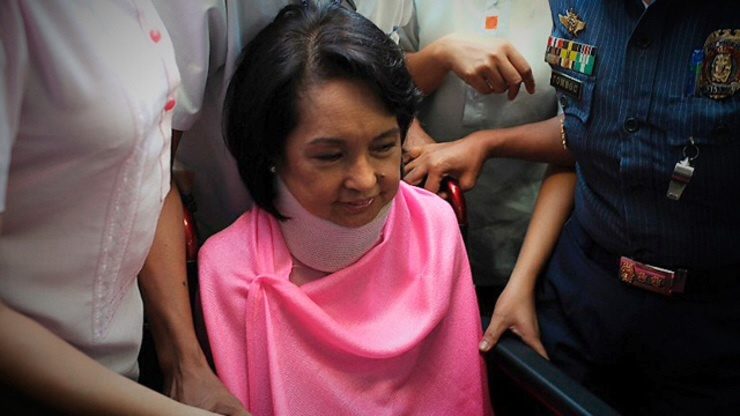SUMMARY
This is AI generated summarization, which may have errors. For context, always refer to the full article.

The former president says the prosecution failed to prove beyond reasonable doubt that she conspired with officials to personally gain from charity funds
MANILA, Philippines – Former President and now Pampanga Representative Gloria Macapagal Arroyo asked the anti-graft court Sandiganbayan for her acquittal from plunder charges.
She cited good faith in the integrity of her subordinates when she approved the utilization of P365.9 million in special charity funds, which complainants said was misused.
In a 48-page demurrer to evidence filed Wednesday, August 27, before the court’s 1st division, Arroyo said the evidence against her presented by the prosecution failed to prove her guilt beyond reasonable doubt. The prosecution had rested its case.
“President Arroyo, as any president would, relied, in good faith, on the system to work,” read the pleading.
“She presumed, as does the law, that the COA (Commission on Audit) Chair and PCSO (Philippine Charity Sweepstakes Office) GM (General Manager) and Directors would act in good faith and perform their functions in accordance with the Constitution and the law,” it read further.
Arroyo was charged with the non-bailable offense of plunder for allegedly repeatedly transferring proceeds from the Confidential/Intelligence Fund (CIF) of the PCSO to fictitious expenditures for personal gain.
Move to file demurrer granted
Based on her charge sheet, Arroyo allegedly approved between January 2008 and June 2010 requests for fund releases sourced from the CIF despite a vague list of expenses.
Earlier, the court allowed Arroyo to file a demurrer to evidence.
This gives her the opportunity to ask for her acquittal based on the weakness of the evidence against her and without having to present her camp’s counter-evidence.
Arroyo is currently under hospital detention at state-run Veterans Memorial Medical Center (VMMC).
She earlier asked that she be allowed to post bail, citing her constant distress while in the hospital. (READ: Gloria Arroyo cites hospital ‘distress’ in bail plea)
No conspiracy, no plunder
In the demurrer, Arroyo’s lawyers led by Jose Flaminiano argued that their client’s participation in the subject disbursements was the mere approval of requests made by then PCSO GM Rosario Uriarte.
“In affixing her ‘ok’ to the requests for CIF, President Arroyo gave her consent to the use of the CIF for the purposes described in the requests. That is all that she did,” the document read.
Citing the long years of service of the PCSO and COA officials involved, the pleading said “there was no reason for President Arroyo to doubt their competence or integrity.”
Arroyo’s camp further argued that her approval merely “facilitated” the release of the funds and that the prosecution was unable to prove a conspiracy existed between her and the PCSO officials.
The absence of the element of conspiracy belies the claim of plunder, her lawyers argued.
“By reading a conspiracy into the President’s act of approving the requests for CIF, the Prosecution is doing what the Supreme Court said it cannot do: It is allowing ‘baseless suppositions’ and ‘frenzied theories’ to fill in the gaps in its evidence,” her demurrer read.
‘Vague law in our favor’
Arroyo’s camp further argued that the crime of plunder does not merely involve the misuse of funds or the raiding of public treasury, but involves a series of acts that led to amassing of ill-gotten wealth by a public official.
This means that a public official was enriched in the process and that wealth was concealed and shielded from forfeiture.
“And it is this core element of ‘amassing,’ so central to the charge of Plunder, which the Prosecution failed to prove,” the demurrer read.
She further argued that “even if it is not clear” from the plunder law that the amassing of wealth is “a separate, overarching element” of the crime, “this lack of clarity should be construed in her favor.”
Plunder law in the Philippines
The Anti-Plunder Law or Republic Act 7080 was signed into law in 1991 and was enacted as a response to inadequate legal mechanisms to hold accountable public officers of massive fund diversion.
Former Senator Jovito Salonga, who filed the bill in Senate, said current laws at the time “were clearly inadequate to cope with the magnitude of the corruption and thievery committed during the Marcos years.”
Former dictator Ferdinand Marcos allegedly amassed ill-gotten wealth whose recovery is still ongoing almost 3 decades since his ouster. – Rappler.com
Add a comment
How does this make you feel?
Loading
There are no comments yet. Add your comment to start the conversation.